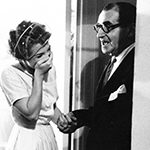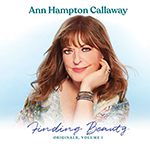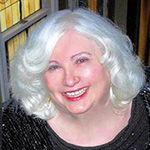Gabrielle Stravelli
Birdland Theater, NYC, October 25, 2019
Reviewed by Marilyn Lester for Cabaret Scenes

The jazz world abounds with talent, both vocal and instrumental, but within this universe the ones who have a true, deep feeling for jazz are few and far between. Gabrielle Stravelli is one of the rarities. She embodies the jazz ethic from the top of her head to the soles of her feet. The fabled New York Times critic, Stephen Holden, once compared her to a cocktail, writing, “In the first couple of sips, the predominant taste is the sparkling wine that has drifted to the top, for Ms. Stravelli’s bright, rippling voice exudes a natural effervescence. Before long, it darkens, and the heady liquor underneath kicks in.” Holden’s poetic description captures the singer perfectly, and in this turn at Birdland Theater, her moods were many, displaying an amazing versatility as a performer. The cherry on the sundae was the captivating and varied set list ranging from Songbook standards to the work of contemporary artists to Stravelli’s own compositions.
Her opening number, a bright and bouncy “If This Isn’t Love” (Burton Lane/E.Y. Harburg) revealed her enthusiasm and commitment to the music. Tenor saxophonist Tim Armacost was featured, playing lines as a partner in the execution of the piece, a dynamic that carried through most of the songs in the set. With “Time Was,” the English version of “Duerme” (Miguel Prado/Gabriel Luna, translated by Sidney Russell), Armacost played based on the 1957 instrumental version by John Coltrane, while Stravelli sang both the English and Spanish lyrics with equal ease. In her own composition, “Bicycle Blues,” the singer was in high bebop jazz mode, scatting brilliantly and offering spirited call and responses with Armacost.
Stravelli’s most recent CD, Pick Up My Pieces, released in April 2019, features the music of Willie Nelson. From this album she sang Nelson and Waylon Jennings’ 1969 hit “Good Hearted Woman” as a slow ballad from the woman’s point of view. It was a version filled with a tremendous amount of soul. A fun piece was a jazzy take on “Mammas Don’t Let Your Babies Grow Up to Be Cowboys” (Ed and Patsy Bruce) with country inflection, consummate scatting, and creative harmonizing with Armacost on the sax. Her Willie Nelson “karma medley” of “Blame It on the Times”/“Little Old Fashioned Karma”/“Nobody Slides, My Friend” was also full of countrified scat and sly amusement. Stravelli’s ability at vocalese, a true test of jazz mastery, was on display with a bop-infused original piece, “Runnin’ Back for More.”
Lest anyone think that Stravelli is just vocal bells and whistles, two songs in particular showcased her depth of storytelling ability and capacity to inhabit the lyric completely. With the most interesting of Hoagy Carmichael’s melodies, “Baltimore Oriole” (lyrics by Paul Francis Webster), Stravelli mastered this story song with sultry, vivid flair, building to a dramatic climax.
buy valtrex Canada https://langleyrx.com/valtrex.html no prescription
In her closing number, Stephen Foster’s 1854 parlor song, “Hard Times Come Again No More,” Stravelli sang with soulful grace, morphing the ballad to contemporary relevance with clarity and strength. Musical support was supplied by Stravelli’s ace band of pianist Josh Richman, bassist and music director Pat O’Leary, and drummer Eric Halvorson.





